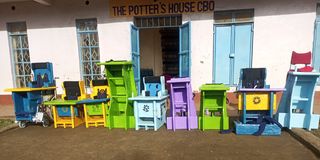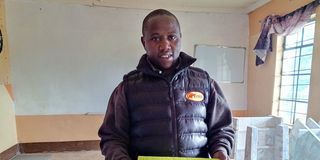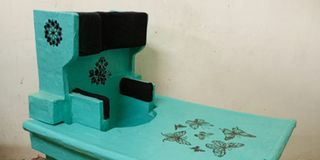Assistive devices made from cardboard target low-income families

A display of some of the assistive devices made from cardboard boxes.
Children living with physical disabilities face numerous challenges, particularly in obtaining assistive devices that fit them.
Families often struggle to access appropriate devices, which are essential for preventing injuries and enhancing the child's functionality and independence, thereby promoting their well-being.
In Njoro town, near the main road, the Appropriate Paper-Based Technology Kenya (APT Kenya) workshop is busy with activity. Workers are busy arranging and sorting cardboard boxes.

Joseph Ng'ang'a, a supervisor at Appropriate Paper-Based Technology Kenya (APT) Kenya,
Joseph Ng'ang'a, a supervisor at APT Kenya, highlights that many vulnerable households with children suffering from conditions like cerebral palsy, hydrocephalus, and spina bifida cannot afford appropriate devices that would help their children lead normal lives.
"Some parents, especially from low-income areas, cannot purchase the right equipment for their children because some are very expensive," Ng'ang'a says.
To address this challenge, the organisation produces affordable assistive devices using locally available materials such as cardboard boxes and newspapers.
"The appropriate paper-based devices are made from locally available materials, making them easily accessible," Ng'ang'a explains.
The assistive devices produced include chairs, standing frames, and wheelchair inserts, typically completed within a week.

Sitting chair for children with disabilities made by Appropriate Paper-Based Technology Kenya (APT Kenya).
Though many of the devices are provided to children in need, Ng'ang'a mentions that some caregivers support the workshop by bringing necessary materials or assisting with tasks.
"Most of our beneficiaries are from vulnerable families who can't afford the devices. In return, caregivers are allowed to work in any section of the workshop or bring some of the materials needed, although it's not mandatory," he notes.
Ng'ang'a emphasizes their goal of ensuring children are not confined to their homes, spending their days lying on the floor or bed, unable to sit up, stand, participate in family life, or be part of the community.
Since 2022, APT Kenya has produced 600 assistive devices, benefiting 120 children. The demand remains high, with orders booked for the next three months.
Ng'ang'a points out that the devices require sunlight to dry, and during rainy seasons there is a slowdown in production which is a challenge since it increases the backlog.
"If the device gets rained on, it means it's damaged, and we have to make a new one. We also encourage caregivers to avoid keeping the devices in damp areas," he notes.
The organization has grown from two to five employees since its inception. They also make board games and beads out of the waste carton boxes.
